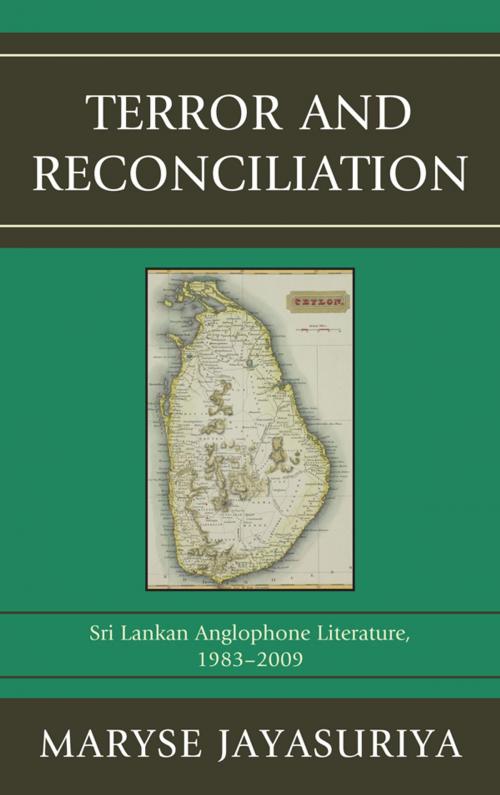Terror and Reconciliation
Sri Lankan Anglophone Literature, 1983-2009
Fiction & Literature, Literary Theory & Criticism, Asian| Author: | Maryse Jayasuriya | ISBN: | 9780739165799 |
| Publisher: | Lexington Books | Publication: | March 29, 2012 |
| Imprint: | Lexington Books | Language: | English |
| Author: | Maryse Jayasuriya |
| ISBN: | 9780739165799 |
| Publisher: | Lexington Books |
| Publication: | March 29, 2012 |
| Imprint: | Lexington Books |
| Language: | English |
Terror and Reconciliation explores the English language literature that has emerged from Sri Lanka’s quarter-century long ethnic conflict. It examines poetry, short fiction and novels by both diasporic writers and writers resident in Sri Lanka. Its discussion of resident Sri Lankan writers is particularly important because it calls attention to a rich and ambitious body of work that has largely been ignored in the Western academy and media until now. The book outlines the ways in which a wide range of resident and diasporic writers have sought to represent the conflict, mourn the violence and terror associated with the conflict, and present options for reconciliation in the conflict’s aftermath. The writers discussed grapple with issues of terrorism, human rights, nationalism, war, democracy, gender, ethnicity, and reconciliation, making this a study of profound interest for students and scholars of South Asian literature and culture, postcolonial studies, race and ethnic studies, women’s studies, and peace studies.
Terror and Reconciliation explores the English language literature that has emerged from Sri Lanka’s quarter-century long ethnic conflict. It examines poetry, short fiction and novels by both diasporic writers and writers resident in Sri Lanka. Its discussion of resident Sri Lankan writers is particularly important because it calls attention to a rich and ambitious body of work that has largely been ignored in the Western academy and media until now. The book outlines the ways in which a wide range of resident and diasporic writers have sought to represent the conflict, mourn the violence and terror associated with the conflict, and present options for reconciliation in the conflict’s aftermath. The writers discussed grapple with issues of terrorism, human rights, nationalism, war, democracy, gender, ethnicity, and reconciliation, making this a study of profound interest for students and scholars of South Asian literature and culture, postcolonial studies, race and ethnic studies, women’s studies, and peace studies.















